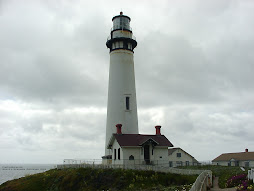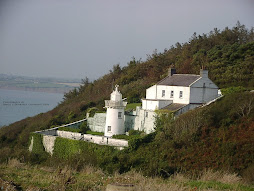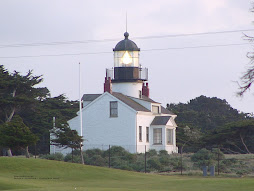The time of year is once upon us; time to emblazon the masts and decks with festive lighting adorning our boats and yachts in Christmas cheer. Unfortunately, numerous times during this joyous season, injuries and fires occur as a result of decorative lighting, so here's a few tips to help make your holiday decorating safe:
1. Every outdoor light or fixture must be connected to a Ground Fault Circuit Interrupter, often referred to as a GFCI. It's a protective device that is critical for all outside lighting and decorative devices. If you don't have GFCI's permanently installed on your electrical system controlling your deck and other outside outlets, get them installed! In the interim, you can purchase temporary GFCI's as part of electrical cord sets such as contractors use and plug your light sets into the cord set. Not highly recommended over permanent GFCI's, but lots better than none at all. All potentially wet or damp location electrical outlets requires a GFCI. Period.
2. Use only U/L Listed electric lights, cords and timers. It's also wise to check the Consumer Product Safety Commission website on occasion for recalled products (http://www.cpsc.gov/) as some of the poorly assembled light sets from overseas are frequently recalled due to shock or fire hazards.
3. Use only lights that are listed for outdoor use if you are placing them outdoors. Those listed for indoor/outdoor use are suitable too. Same goes for extension cords and timers and other electrical equipment. Be sure it's listed for, and suited for, outside use. Protect timers and connections from direct rain and moisture as much as possible, Be sure to place electrical connections where children will not be prone to contact them. I wrap every plug connection with electrical tape or shrink tape to form a weather-resistant mating just as an extra measure of caution, in case the wire ends up laying on the deck in the rain. Keep cord sets up and off the decks and protected from being in direct contact with the water as much as possible. Remember this is 120 volts we're dealing with and it can be deadly!
4. Connect only the recommended number of strings of lights together so as not to exceed the safe current capacity of the wiring. You may be running the lights off a fifteen or twenty ampere circuit but the wiring to the strings may be only able to support a fraction of that amount of current.
5. Consider using L.E.D. (Light Emitting Diode) lights, and replacing worn out strings of lights with the new LED lights. They use much less electricity, which will save on your electric bill, are cool to the touch so they're safer, and many are rated for 10,000 hours of light which means years of use without trying to find that darned single burned out bulb in the string that caused the entire thing to go out! Prices have come way down besides, making them very affordable.
6. Use care when hanging lights. Wiring is fragile and can be damaged easily on some of the strings. If a string appears to be damaged, do not attempt to repair it. Discard it and replace it with a new set. Plus, some of the home centers have trade-in coupons on trading in your old incandescent lights on the neer LED lights!
7. Consider using timers on your lights to avoid having to plug in and unplug your lights every night. Timers come in weatherproof versions at very reasonable prices, and many are available that will allow lights to come on at dusk, then remain on for a period of time you set, from 2 hours all the way up to 12 hours, or until daylight if you prefer. Saves energy, both electrical and yours!
8. Check all lights and wiring before using and again at the end of the season. If anything needs replacement, after Christmas sales may be the ideal time to do so, saving some cash and a potential injury or fire loss at the same time.
9. Take care when placing decorations and lights near walkways, docks, and other areas people or animals may transit. If they brush against or become entangled in the wiring, falls, shocks and other injuries can occur. We all laugh as Chevy Chase and others stand in awe as the decorations fall off the roof, or the lights fall on the neighbor, but when it happens at your boat or home, it isn't all that funny.
10. Be safe with ladders. Make sure the ladder is securely footed and has a good grip on the deck or ground. The base of the ladder should be level and firm and far away enough from the vertical surface that the ladder will not tilt back when you climb it. Follow the 1:4 ratio, where the base of the ladder is one foot away from the vertical surface for every 4 feet of vertical rise. Thus if you have a 10 foot bulkhead, the ladder should be a minimum of 2 1/2 feet away from the wall at the bottom. The top of the ladder should extend 3 feet above the roof or support surface at the top. Have a ladder buddy hold the ladder when possible. Use a ladder with rubber non-slip feet.
If you're using a stepladder, never stand on the top; it's not a step. Stay two steps down from the top. Be sure the ladder is secure before climbing.
Be sure ladders are in good condition before use. And, look around before using a ladder. If you're using an aluminum ladder...check for electric lines! (This applies to when you are installing antennas or masts as well...I hate the crackling sound of fried mariners!) Get in the habit of checking your surroundings, so when you put up or remove your decorations, you can do it safely. Aluminum ladders and electricity are NOT friends. Be safe, not sorry.
11. If you're using a generator to power your lights and display, be sure it has a GFCI connected to the power outlet, and that the generator is grounded! Generator power can be just as deadly as utility power if something goes wrong. If you're using a generator, be sure the exhaust is located far away from all sources of entry to your vessel to avoid carbon monoxide poisoning. Have your CO monitors up and working; test them regularly and heed any alarms you receive. Many a party has ended suddenly and, in some cases, tragically, as a result of generator exhaust entering the cabin and overcoming the party-goers. It's a silent killer, so be sure it doesn't come stalking your holiday gathering!
Enjoy the season safely and ...
SAFE BOATING, MERRY CHRISTMAS and HAPPY HOLIDAYS!
Top 60 Boating Tips by Boating Magazine
Wednesday, December 9, 2009
Outdoor Christmas Lighting & Holiday Displays
Labels:
Christmas,
Christmas Lights,
Decorations,
Electricity,
Falls,
Holidays,
Lighting,
Outdoor lights
Subscribe to:
Post Comments (Atom)













2 comments:
Good post, nice blog. Thanks for share.
Very nice. Thank you.
http://www.electric-safety.blogspot.com/
Post a Comment